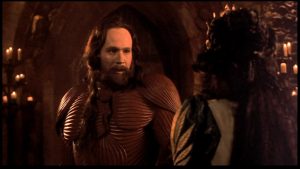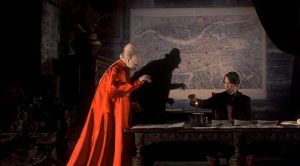From the November 20, 1992 Chicago Reader. — J.R.


A good reason for including the name of the original author in the title of Francis Ford Coppola’s ambitious version of the famous vampire story is that most previous film versions have been based not on the 1897 novel but on Hamilton Deane and John Balderston’s 1927 stage adaptation. This version, written by coproducer James V. Hart, brings back the multiple narrators of the novel, leading to a somewhat dispersed and overcrowded story line that remains fascinating and often affecting thanks to all its visual and conceptual energy. (Some of this derives from the filmmakers’ musings about what was going on culturally in Europe at the turn of the century, including the decadent art of people like Beardsley, Klimt, and Huysmans and the birth of both movies and psychoanalysis.) Still the overreacher, Coppola suffers at times from a surfeit of ideas (rather than a dearth, like most of his colleagues); there are times when he squanders his effects (as he did in Rumble Fish), or finds some of them in unlikely places. (Murnau’s Faust has apparently exerted more of an influence than his Nosferatu, for instance.) But this is still the best vampire movie in ages — a visual feast with ideas, more disturbing than scary, though a rich experience in many other respects. Read more
This appeared in the May 22, 1998 issue of the Chicago Reader. — J.R.

Bulworth
Rating *** A must see
Directed by Warren Beatty
Written by Beatty and Jeremy Pikser
With Beatty, Halle Berry, Oliver Platt, Jack Warden, Paul Sorvino, Don Cheadle, and Amiri Baraka.
By Jonathan Rosenbaum
“Warren Beatty co-wrote, directed, and stars in this satire about a self-destructive U.S. senator using race-baiting tactics to get reelected.” I assume Mark Caro hadn’t seen Bulworth when he wrote this capsule for the Chicago Tribune‘s May 10 summer movie preview. It only goes to show the risks you run when you try to make a movie that tells the truth politically and then limit this “truth” to a series of sound bites; sooner or later that form of TV abbreviation is going to bite you back.
More precisely, Bulworth is about a Democratic senator from California (Beatty), up for reelection in 1996, who is having a nervous breakdown, takes out a contract on himself, and then finds himself blurting out the truth instead of the usual packaged lies during his campaign. He hasn’t slept for days, and after throwing caution to the winds and going off to a hip-hop club with Nina (Halle Berry) and two other young women from South Central LA, he starts parsing out all his public statements in rap, scandalizing his staff and various media people with the form and content of his forthright declarations. Read more



